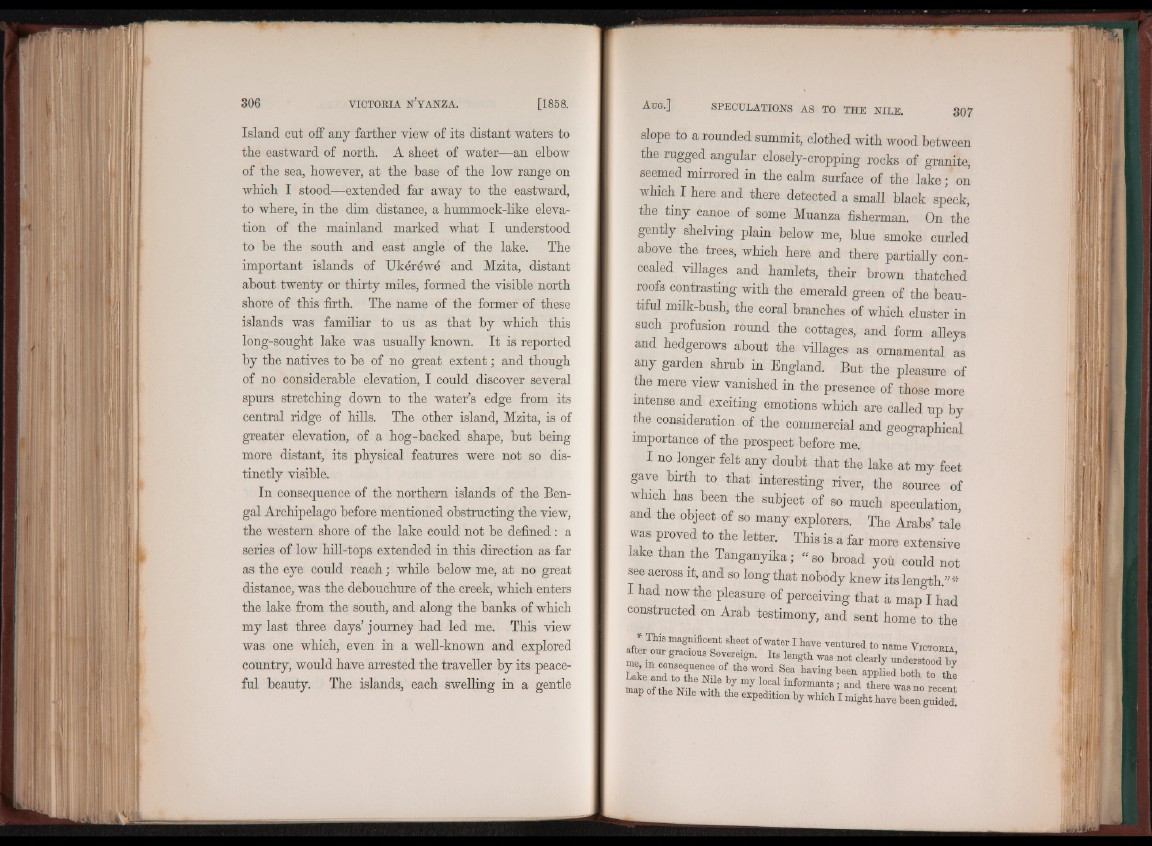
Island cut off any farther view of its distant waters to
the eastward of north. A sheet of water—an elbow
of the sea, however, at the base of the low range on
which I stood—extended far away to the eastward,
to where, in the dim distance, a hummock-like elevation
of the mainland marked what I understood
to be the south and east angle of the lake. The
important islands of Ukdrdwe and Mzita, distant
about twenty or thirty miles, formed the visible north
shore of this firth. The name of the former of these
islands was familiar to us as that by which this
long-sought lake was usually known. I t is reported
by the natives to be of no great extent; and though
of no considerable elevation, I could discover several
spurs stretching down to the water’s edge from its
central ridge of hills. The other island, Mzita, is of
greater elevation, of a hog-backed shape, but being
more distant, its physical features were not so distinctly
visible.
In consequence of the northern islands of the Bengal
Archipelago before mentioned obstructing the view,
the western shore of the lake could not be defined : a
series of low hill-tops extended in this direction as far
as the eye could reach; while below me, at no great
distance, was the debouchure of the creek, which enters
the lake from the south, and along the banks of which
my last three days’ journey had led me. This view
was one which, even in a well-known and explored
country, would have arrested the traveller by its peaceful
beauty. The islands, each swelling in a gentle
slope to a rounded summit, clothed with wood between
the rugged angular closely-cropping rocks of granite,
seemed mirrored in the calm surface of the la k e /o n
which I here and there detected a small black speck,
the tiny canoe of some Muanza fisherman. On the
gently shelving plain below me, blue smoke curled
above the trees, which here and there partially concealed
villages and hamlets, their brown thatched
roofs contrasting with the emerald green of the ‘beautiful
milk-bush, the coral branches of which cluster in
such profusion round the cottages, and form alleys
and hedgerows about the villages as ornamental as
any garden shrub in England. But the pleasure of
the mere view vanished in the presence of those more
intense and exciting emotions which are called up by
t e consideration of the commercial and geographical
importance of the prospect before me.
I no longer felt any doubt that the lake at my feet
gave birth to that interesting river, the source of
which has»been the subject of so much speculation,
and the object of so many explorers. The Arabs’ tale
was proved to the letter. This is a far more extensive
lake than the Tanganyika; “ so broad you could not
see across it, and so long that nobody knew its length.”*
had now the pleasure of perceiving that a map I had
constructed on Arab testimony, and sent home to the
This magnificent sheet of water I have ventured to name Victokia